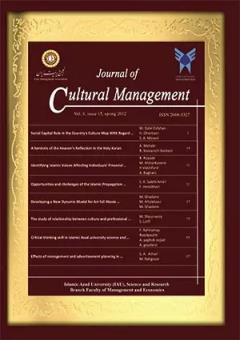Designing the model of organizational culture and investigating its relationship with the excellence of the regulatory organization (case study of judicial complexes in Tehran)
Subject Areas : Journal of Cultural Management
fatamah jafarnia
1
,
Seyed Abdullah Sajjadi Jagharq
2
*
,
احمد هاشمی
3
![]()
1 - Department of Public Administration, Emirates Branch, Islamic Azad University, Dubai, United Arab Emirates
2 - Department of Executive Management, Science and Research Unit, Islamic Azad University, Tehran, Iran (Corresonding Author)
3 - Department of Educational Sciences, Lamard Branch, Islamic Azad University, Lamard, Iran
Keywords: Key words: organizational culture, regulatory organization excellence, judicial complexes.,
Abstract :
abstract
Introduction and Aim Organizational culture creates the personality of an organization. Just as knowing the personality of a person helps in analyzing his behavior, knowing the organizational culture can be effective in guiding and carrying out organizational changes and transformations. In addition, creating a favorable organizational culture helps to improve the organization. Therefore, the aim of the current research is to design the organizational culture model and examine its relationship with the excellence of the regulatory organization in the judicial complexes of Tehran.
Method The research method was done in a mixed (qualitative-quantitative) way. In the qualitative part of the research, while examining the documents, interviews were conducted with 11 judges and expert staff through targeted sampling. The resulting data were analyzed using the theme analysis method of Brown and Clark (2006). In the quantitative part, which is based on the qualitative part, 160 judges of judicial complexes of Tehran city investigated the current situation and tested the designed model using a questionnaire. In order to analyze the data, structural equation model and Smart PLS3 software were used.
Results: The model resulting from the research had 33 primary themes, 9 secondary themes and 2 main themes of organizational culture and regulatory organization excellence.
Conclusion Interpretation and analysis of research data showed that organization managers can facilitate the process of regulatory organization excellence in judicial complexes by creating an organizational culture appropriate to the organization.
منابع
منابع فارسی
• ابزری، مهدی و دلوی، محمدرضا. (1388). نیل به تعالی(سرآمدی) از طریق تقویت فرهنگ سازمانی. جامعه شناسی کاربردی، 20(1)، 171-196.
• امیری، الهام؛ تیمورنژاد، کاوه و سعیدی، لیلا. (1403). بررسی وضعیت فرهنگ سازمانی با رویکرد استراتژی فرهنگ مشارکتی در مرکز مطالعات و برنامه ریزی شهر تهران، نشریه مطالعات مدیریت شهری، 16(57)، 66-84.
• تعقلی، صفدرعلی و امام قلی زاده، سعید. (1393). بررسی رابطه فرهنگ سازمانی با ابعاد مدل تعالی سازمانی EFQM و ارئه مدل بومی - کاربردی «فرهنگ - تعالی» بر اساس اصول بنیادین تعالی،اولین کنفرانس ملی جایگاه مدیریت و حسابداری در دنیای نوین کسب و کار، اقتصاد و فرهنگ،علی آباد.
• داوری، علی و رضازاده، آرش. (1392). مدل سازی معادلات ساختاری با نرم افزار PLS . تهران: جهاد دانشگاهی.
• سلمانی نژاد، رمضانعلی، دانشور، مریم، و میرفخرالدینی، سیدحیدر. (1391). ارتقاء فرهنگ سازمانی: کاربرد الگوی تعالی سازمانی ایران. بهبود مدیریت، 6(1 (پیاپی 15))، 128-152.
• شیخ زاده، محمد. (1390). تدوین الگوي رهبري خدمتگزار مبتنی بر دیدگاه امام خمینی ره. تهران: پایان نامه دکتري دانشگاه تهران، دانشکده مدیریت.
• فرهیخته، فاطمه؛ موسوی، سید نجم الدین؛ حکاک، محمد و وحدتی، حجت. (1399). طراحی الگوی شایستگی مدیران قضایی ایران. فصلنامه مدیریت منابع در نیروی انتظامی، 8(1)، 33-62.
• کریمی جعفری، فاطمه؛ حقیقی کفاش، مهدی و بهرامی، امیر. (1392). رابطه بین فرهنگ سازمانی و توانمندسازهای مدل تعالی سازمانی با تأکید بر نقش تعهد عاطفی کارکنان صنعت بیمه. پژوهشنامه بیمه، 3(1)، 85-99.
منابع انگلیسی
• Braun, V. & Clarke, V. (2006). Using thematic analysis in psychology. Qualitative Research in Psychology, Vol. 3(No. 2), 77-101.
• Coglianese, C. (2020). The challenge of regulatory excellence. Achieving regulatory excellence, (20-19).
• Coglianese, C. (2018). Listening, learning, leading: a framework for regulatory excellence. Journal of Nursing Regulation, 8(4), 64.
• Coglianese, C. (2015). Defining and Assessing Regulatory Excellence.
• Ellis, J. (2016). Achieving regulatory excellence. Brookings Institution Press.
• EL-Makarem, A. A. (2023, October). The Importance of Utilizing Organizational Culture in Achieving Organizational Excellence Models. In Abu Dhabi International Petroleum Exhibition and Conference (p. D021S060R006). SPE.
• Gunningham, N. (2017). Compliance, enforcement, and regulatory excellence. RegNet Research Paper, (124).
• Hussain, T., Khalid, M., & Waheed, S. (2010). Factors that lead organizations to achieve business excellence. Journal of Quality and Technology Management, 6(1), 1-17.
• Kassem, R., Ajmal, M. M., & Khan, M. (2017). The relationship between organizational culture and business excellence: Case study from United Arab Emirates. In Organizational Culture and Behavior: Concepts, Methodologies, Tools, and Applications (pp. 732-751). IGI Global.
• Lasrado, F. (2020). Let's get everyone involved! The effects of transformational leadership and organizational culture on organizational excellence. International Journal of Quality & Reliability Management.
• Nenadál, J., Vykydal, D., & Waloszek, D. (2018). Organizational excellence: approaches, models and their use at Czech organizations. Quality innovation prosperity, 22(2), 47-64.
• Nikbakht, A., Nikbakht, E., Rad, A & Iravani, M. (2012). A study to measure the impact of organizational culture and organizational excellence.Management Science Letters , 2(8), 2875-2880.
• Malagas, K., Kontos, G., Yilmaz, A. K., & Nikitakos, N. (2022). Organizational culture: Types and critical success factors for organizational excellence. Advances in Sociology Research, 75-109.
• Qawasmeh, F. M., Darqal, N., & Qawasmeh, I. F. (2013). The role of organization culture in achieving organizational excellence: Jadara University as a case study. International Journal of Economics and Management Sciences, 2(7), 5-19.
• Sampaio, P. (2017). Organizational excellence: The desired journey. In The Quality Management Forum (No. 3, pp. 6-7).
• Thurlow, A., Kushniryk, A., Yue, A. R., Blanchette, K., Murchland, P., & Simon, A. (2017). Evaluating excellence: A model of evaluation for public relations practice in organizational culture and context. Public Relations Review, 43(1), 71-79.
• Zarei, Z., Afshari, P., Jahanbani, E., Haghighi, MH. (2020). //Evaluating the Effect of Leadership Style on Burnout among the Midwives Working at Maternity Hospitals of Khuzestan Province. International Journal of Pharmaceutical and Phytopharmacological Research Vol. 10. No. 1: 122-126.

